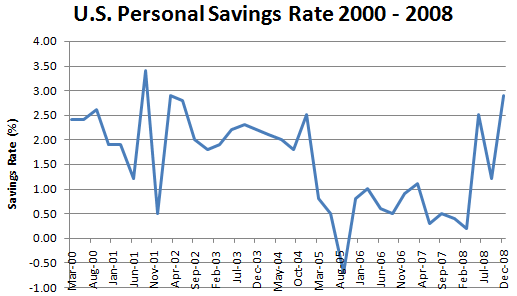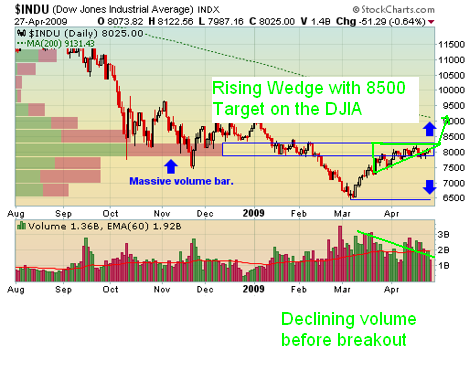Another Huge Day of Gains
This is shaping up to be another great week. The flu pandemic was a dud, as I astutely predicted. No one cares about banks and crisis anymore. Yesterday, helicopter Ben alluded that the recession “appears to be somewhat slower”, and that he has no plans to remove the punch bowl. Once again, the adage ‘don’t fight the fed’ holds true.
Seeking Alpha Author ‘Marketing Charts’ reflects on the improvement in consumer sentiment:
Although overall levels of the Consumer Confidence Index are still low, retailers and other businesses can still take the significant growth in its numbers, especially in the Expectations Index, as a positive sign about the current mindset of US consumers. There have been a number of mixed positive and negative economic and consumer behavior signals so far this yea…
I concur. Consumer spending is returning with a vengeance as consumer confidence rebounds.
Laughably, leftist pundits are predicting some new ‘age of frugality’, risk aversion, de-leveraging, regulation, misery, and restraint. Fools. That’s not going to happen. We’re still in the age of prosperity and unfettered free market capitalism; the anathema of the piss-poor, Ron Paul endorsing isolationist. Below is a picture of some of these sore losers:

More maxed out credit cards, deficits, and widening of wealth gap, which is bullish for stocks. Need to outsource more jobs. Too much employment bad for profits. Although personal savings rates are hovering around five percent, I anticipate they will go negative by the end of the year, and remain that way.

I still stand by the claim that that nothing changed fundamentally with regards to the US economy between now and April 2007. Just a temporary dip in GDP.
This bull market will be a perpetuation of consumerism, materialism, spendism, globalism, and a get-rich-quick mentality - the same constituents of the 2002-2007 bull market. Like the last bull market we will also have a jobless recovery, and as expected pessimists will be dumbfounded by how quickly the stock market and economy recovers in spite of this. Dow 14,000 here we come.
Is the Swine Flu Obama’s Katrina?
There is already bellyaching on the radical left regarding Obama’s perceived lack of urgency regarding the imaginary flu pandemic.
Michelle Richmond from SF Gate writes
President Obama said that there was “cause for concern and…a heightened state of alert,” but that there was no “cause for alarm.” A measured response from a man who proved himself to be reassuringly practical and non-alarmist in the early days of the economic crisis…
…As Americans, we’re conditioned to believe that everything is just fine until the moment it very obviously is not; and yet, Napolitano’s assurances that the emergency warning “sounds more severe than it really is” don’t entirely calm the nerves.
But what if the US government and World Health Organization is overreacting? Efforts to temper panic may have unintended consequences. Websites like Google, Facebook, Twitter, and Amazon.com, for example, benefit from people staying at home, instead of going to work or school. Consumers also need to max out their credit cards by staying at home to shop on amazon.com, which benefits Visa and Mastercard stock, too. If people are no longer hesitant to go outside it will hurt these companies’ revenue and pageviews, which will later be reflected in the stock market. In addition, having too much employment or too many people working, instead of spending, isn’t good for the economy because it creates inflation.
Bullish Rising Wedge Forming
Despite flu fear mongering and other nonsense, the charts allude to a massive breakout.

We Need an Immigration Stimulus
L. GORDON CROVITZ wrote an excellent article for the Wallstreet Journal on why immigration should be embraced as a form of economic stimulus.
The pace of lower-skilled migration has slowed due to higher unemployment. This could make it less contentious to ease the path to legalization for the 12 million undocumented workers and their families in the U.S. It’s also a good time to ask why we turn away skilled workers, including the ones earning 60% of the advanced degrees in engineering at U.S. universities. It is worth pointing out the demographic shortfall: Immigrants are a smaller proportion of the U.S. population than in periods such as the late 1890s and 1910s, when immigrants gave the economy a jolt of growth.
I emphatically agree. The problem with American labor it that it’s too expensive. Unnecessary amenities like pensions, heath care, severance pay and worker safety eats into corporate profits. In addition, laws regarding hiring discrimination and or wrongful termination need to be rescinded.

The strength of the US economy isn?t in unionized, entitlement based jobs, but in the meritocracy embodied by the Internet, service, and finance sectors where lifetime employment and retirement subsidized at the expense of the company aren?t a guarantee. But in exchange, smartist companies like Google, Apple, Amazon.com, Visa, Twitter, Wallmart, Myspace, Facebook are created. That’s why meritocracy based companies like Goldman Sachs and Apple are thriving. On the other hand, General Motors is failing because it is encumbered by parasitic unions.
In order to accelerate the transition to a type one civilization and make the stock market go higher, politicians and corporations need to embrace insourcing and outsourcing, therefore widening the wealth gap. The ‘middle class’ is a relic of a bygone era. I implore the Obama administration to offer some sort of incentive for companies that ship inefficient jobs overseas and or insource skilled labor, as Gordon Crowitz is suggesting. Thomas Friedman also shares similar views, being that the world is flat.
